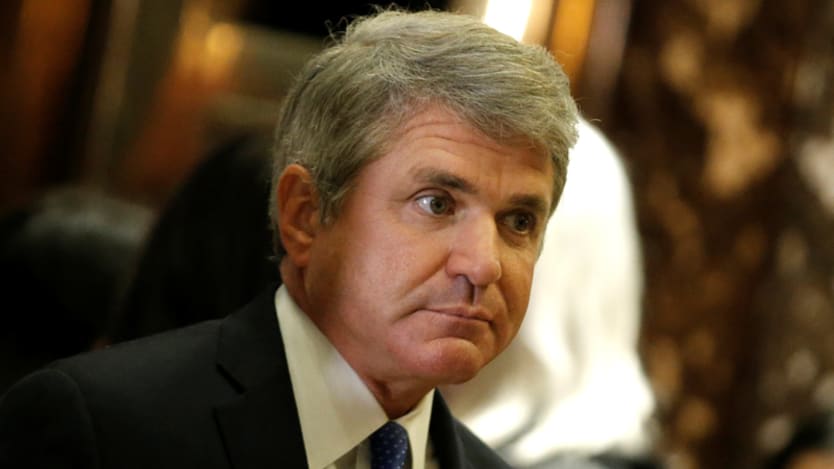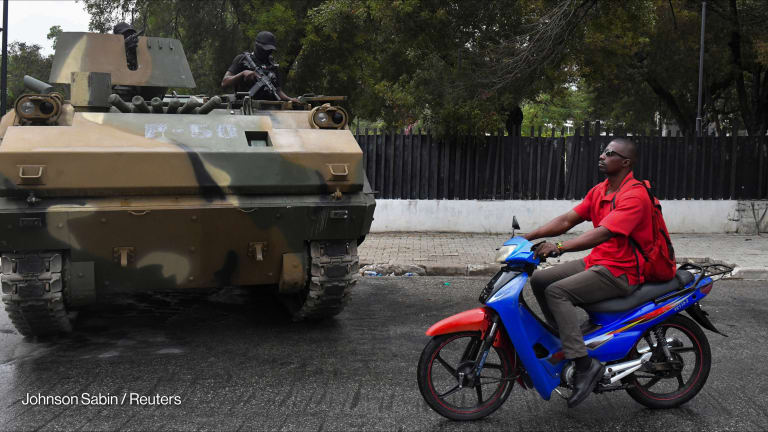
WASHINGTON — The U.S. has succeeded militarily when it has had to, but it has fallen short on efforts to prevent conflict and help ensure stability, Representative Mike McCaul, the top Republican on the House Foreign Affairs Committee, said Monday.
“If we fail on the prevention side, then we have no alternative but with the military and it’s always the last option. You want the diplomats to succeed at their job.”
— Mike McCaul, Republican rep.He laid out a vision for what he sees as a foreign aid policy driven by focusing more on how the U.S. can help stabilize countries to prevent conflict or displacement at an event at the Wilson Center in Washington, D.C.
“We’ve done a pretty good job defending the nation, I'd say 95 percent of the plots or attacks we stopped. We’ve done pretty good offensively, gone in and done what we've done to get rid of al-Qaida and ISIS. We've done a really poor job of prevention,” he said.
To that end, McCaul, along with HFAC chairman Rep. Eliot Engel, a Democrat from New York, and bipartisan colleagues in the Senate, introduced the Global Fragility Act, which would bring together the U.S. Agency for International Development, the Department of Defense, and the Department of State to work on extremism and stability.
More on the future of U.S. Aid:
► Mike Pompeo defends budget, policies in US House hearings
► US budget slashes global development funding, stresses burden sharing
► USAID mulls proposal to train aid workers as special forces
“If we fail on the prevention side, then we have no alternative but with the military and it’s always the last option,” McCaul said. “You want the diplomats to succeed at their job.”
This concept of prevention applies to a wide number of places geographically, from Central America to the Sahel in Africa, he added.
Some people, if they haven’t studied the issue or haven’t seen the situation firsthand, might not understand what foreign aid in Central America actually does, he added.
McCaul, who was in El Salvador over the weekend with Engel and others on a congressional delegation, said that he saw the work that USAID and other government officials are doing. He heard about programs that reroute at-risk youth into training or computer science programs, and have also cooperated on international law enforcement programs that are targeting the MS-13 gang, he said.
“In the last two years, the numbers with respect to this aid has actually lowered the crime rate, helped the economy. You've got to stabilize these areas and if we don't, it's just going to get worse and it's not going to help the immigration situation,” he said. “If we don't address the root cause of the problem through the Central American security initiative, we're going to continue to have a problem.
HFAC is planning a hearing on the issue, and Engel and McCaul have been discussing strengthening the Central American Regional Security Initiative.
“If we cut all this funding, and a lot of it quite honestly is serious law enforcement that we're doing down there … I think it’s going to make things tragically worse and not better,” McCaul said.
McCaul called the president’s proposed budget, which once again aimed to cut foreign aid spending by more than 20 percent, “more a statement than a real budget,” adding that it was not well received in Congress, which would not go along with the proposed cuts.
There is also a need for investments in prevention in the Sahel, where a lack of prevention and stabilization can lead to more extremism and terrorism, he said.
The situation in Venezuela also demands attention, according to McCaul, who recently visited the Colombia-Venezuela border. He described the humanitarian and migration crisis as “one of the most awful things I’ve seen in my lifetime.”
McCaul laid the blame at Nicolás Maduro’s feet, calling the situation in Venezuela a “difficult foreign policy problem.”
The fact that the crisis is in the same hemisphere, has displaced more than a million people, and has seen an increase in criminal activity makes it a threat to the U.S., he said. There is only a small chance that the U.S. could deploy military force, but it is important that Venezuela knows it is an option because it gives diplomats leverage, McCaul said.
McCaul added that Colombia’s President Iván Duque Márquez had told him that the situation “is a drain” and “unsustainable.”
“The Venezuela crisis is having a very negative impact” on Colombia, and could threaten gains in that country, McCaul said.








